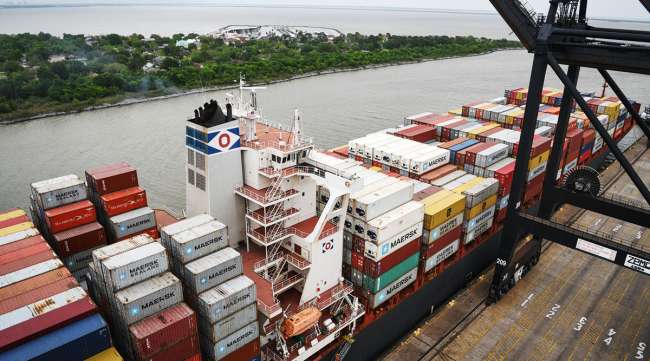US, China Exchange Barbs as Trade Rift Widens Ahead of G-20

[Stay on top of transportation news: Get TTNews in your inbox.]
The U.S. and China exchanged barbs over which nation wrecked trade negotiations, deepening divisions that have laid bare a breakdown in trust between the world’s two largest economies.
“China backpedaled on important elements of what the parties had agreed to,” the Treasury Department and the U.S. Trade Representative said in a joint statement late June 3 in Washington. The comments were intended to answer a “white paper” China released over the weekend intended to defend Beijing’s handling of the negotiations.
On June 4, the Chinese Ministry of Commerce replied to the U.S. response by saying the accusation of backpedaling “is nothing more than mudslinging and is not acceptable to China.”
“It is a common practice to propose changes and make adjustments about the agreement text in the trade talks,” the ministry said.
Already grappling with a slowing economy and President Trump’s trade war, Beijing now has to worry about the rising price of food https://t.co/vjrCteOr6e — The New York Times (@nytimes) June 4, 2019
The finger-pointing reflects the depths that U.S.-China trade relations have sunk to as finance ministers and central bankers from the Group of 20 economies prepare to meet in Japan later this week to discuss the outlook for the global economy. Wall Street’s biggest banks lined up to warn investors of growing recession risks from the escalating trade war between the U.S. and China.
The U.S. is “disappointed” that the Chinese have used the ‘White Paper’ and recent public statements to “pursue a blame game misrepresenting the nature and history of trade negotiations between the two countries,” the Treasury-USTR statement continued.
The statement released by the Beijing government over the weekend with considerable fanfare asserted that President Donald Trump’s decision to raise tariffs on $200 billion of Chinese goods on May 10 was a breach of an agreement reached by Trump and President Xi Jinping.
“These acts contradicted the agreement reached by the two presidents to ease friction through consultation — and the expectations of people around the world — casting a shadow over the bilateral economic and trade consultations and world economic growth,” the authors of China’s paper said. “The U.S. has backtracked on its commitments in the China-U.S. economic and trade consultations, not the other way around.”
The U.S. response said their insistence on “enforceability” stemmed from “China’s history of making commitments that it fails to keep.”
China is subsidizing its product in order that it can continue to be sold in the USA. Many firms are leaving China for other countries, including the United States, in order to avoid paying the Tariffs. No visible increase in costs or inflation, but U.S. is taking Billions! — Donald J. Trump (@realDonaldTrump) June 3, 2019
“President Trump is committed to taking action to address the unfair trade practices that China has engaged in for decades, which have contributed to persistent and unsustainable trade deficits, almost $420 billion last year, and have caused severe harm to American workers, farmers, ranchers and businesses.”
Treasury Secretary Steven Mnuchin will attend the G-20 finance ministers’ summit in Fukuoka, Japan, that begins June 7. Chinese officials are scheduled to attend the gathering. If he meets with the Chinese, it would be the first face-to-face talks after the two sides reached a standoff in two-year negotiations over trade last month.
Trump and Xi have an opportunity to meet at the G-20 summit in Japan later this month.
“Nothing is agreed until everything is agreed,” Vice Commerce Minister Wang Shouwen, who led China’s working-level team in the negotiations, said in Beijing June 2. China does not want a trade war with the U.S. but won’t shy away from one, according to the white paper.




